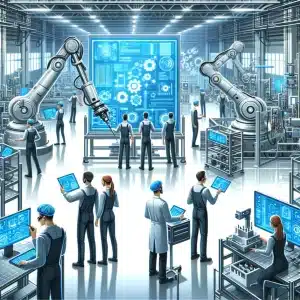Job description: Factory Worker
A factory worker is an individual who performs manual labor tasks in a manufacturing or production setting. They work with machinery and equipment to produce goods and products, and may be responsible for tasks such as assembly, packaging, and quality control. Factory workers must be able to work efficiently and effectively in a fast-paced environment, and have strong attention to detail and manual dexterity skills. The role may also require the ability to lift heavy objects and follow safety procedures.
Description
A factory worker, is responsible for helping to assemble and prepare products for shipment.
Joseph has several duties. His duties include placing raw materials or products into manufacturing machines to facilitate the assembly process, packaging finished products and organizing them for shipment, and performing checks on equipment and products to ensure quality production.
A factory worker is a person who works in a factory, typically performing a variety of tasks involving manual labor. The specific job duties of a factory worker may vary depending on the type of factory and the specific job they are assigned to, but generally, they are responsible for performing tasks related to the production of goods in a factory setting.
Factory workers may work on a production line or in a specific department within the factory, and they may be required to work with a team or independently. They may work with a variety of materials, including metal, plastic, and electronic components, and may be required to stand for long periods of time or lift heavy objects. Factory workers may also be required to follow safety protocols and wear protective equipment, such as hard hats, earplugs, and safety glasses.
Job posting
Here is an example (rtf) of a Factory Worker Job Posting
Here is an example (pdf) of a Factory Worker duties and responsibilities pdf : Storekeeper Job Posting – pdf
We are seeking a full-time, organized, and experienced storekeeper capable of managing all stocks and inventory while ensuring store maintenance. Our ideal candidate should possess multitasking abilities, a learning aptitude, strong organizational skills, and great attention to detail, all while maintaining professionalism with customers. We are looking for a customer-service oriented professional who can efficiently manage inventories, restock supplies, maintain inventory-related records, and report damaged inventories for record-keeping. Additionally, we expect our storekeepers to have hands-on experience using inventory management and material management software to perform all job-related tasks.
Interview questions for a Factory Worker
SIPOC of a Storekeeper
Here is an example (rtf) of a Factory worker SIPOC.
Factory workers play crucial roles in the production processes within industrial settings. Their responsibilities can vary significantly depending on the industry, the specific employer, and the product being manufactured. Here are some common tasks and responsibilities of a factory worker
- Machine Operation: Factory workers often operate machinery designed for specific tasks such as assembling, processing, or packaging products.
- Setup and Calibration: Setting up machinery for operation and calibrating it to ensure it meets specified standards for the production run.
- Product Assembly: Assembling components into final products. This can involve manual assembly or using tools and machinery.
- Quality Assurance: Ensuring the products meet quality standards, checking for defects, and making necessary adjustments.
- Loading Materials: Loading raw materials into machines or onto conveyors for processing.
- Unloading and Storing: Removing finished products or components and ensuring they are safely stored or sent to the next phase of production.
- Routine Maintenance: Performing routine maintenance on machinery to ensure it operates efficiently.
- Cleaning: Keeping the workspace and machinery clean, which is vital for safety and for maintaining the quality of products.
- Monitoring Equipment: Keeping an eye on machinery and production processes to ensure everything is operating as it should.
- Troubleshooting: Addressing and resolving any issues that arise during the production process to minimize downtime.
- Record Keeping: Maintaining accurate records of production volumes, times, and any issues encountered.
- Reporting Issues: Reporting machinery malfunctions or product issues to supervisors or maintenance teams.
- Adhering to Safety Protocols: Following safety guidelines to prevent workplace accidents and injuries.
- Regulatory Compliance: Ensuring all activities comply with relevant regulations and standards, which may include environmental and labor regulations.
- Collaboration: Working collaboratively with other team members to ensure efficient production flow.
- Communication: Communicating effectively with supervisors and coworkers to keep the production line running smoothly and to report any issues promptly.
Factory Worker Skills
Factory workers require a blend of technical, physical, and soft skills to perform their duties effectively. The specific skills needed can vary by industry and the particular roles within a factory setting, but generally, the following skills are highly valued:
- Machine Operation: Ability to operate complex machinery safely and efficiently.
- Maintenance Skills: Basic skills to perform routine maintenance or troubleshoot equipment.
- Quality Control: Understanding quality standards and inspection techniques to ensure products meet required specifications.
- Physical Stamina and Strength: Capability to handle long hours standing, moving, or lifting objects, which is often required in factory settings.
- Manual Dexterity: Skill in handling tools and small components, crucial for assembling products.
- Attention to Detail: Precision is key in production to minimize errors and ensure quality.
- Problem-Solving Abilities: Ability to identify issues and determine logical solutions quickly.
- Communication Skills: Effective communication with team members and supervisors to keep production lines running smoothly and safely.
- Safety Awareness: Knowledge of and adherence to workplace safety protocols to prevent accidents.
- Emergency Response: Understanding of emergency procedures to act swiftly in case of an accident or emergency.
- Adaptability: Willingness and ability to learn new skills or adapt to changes in processes.
- Technological Proficiency: Comfort with using technology, as many factories incorporate advanced machinery and tracking systems.
These skills are essential for factory workers to maintain efficiency, uphold quality, ensure safety, and contribute to the overall productivity of the manufacturing environment.
Factory worker work environment
The work environment for factory workers is often characterized by industrial settings that include large facilities equipped with heavy machinery and production lines. These environments are usually noisy due to the operation of equipment, and temperature conditions can vary significantly, requiring good ventilation, especially in areas where chemicals or other hazardous materials are handled.
Safety is a paramount concern in factories, with workers exposed to potential hazards from machinery, chemicals, and the physical demands of the job, such as standing for long hours or performing repetitive tasks. As such, adherence to strict safety protocols and the use of protective gear like ear protection, gloves, and goggles are essential.
Factory workers typically operate in shifts, including nights and weekends, to ensure continuous production. This can lead to irregular hours and the need for overtime during high production periods. The job involves a high degree of teamwork, with workers often collaborating in teams to manage different stages of the production process. Supervisors closely monitor these teams to ensure efficiency, quality control, and safety.
Modern factories increasingly utilize automated systems and robotics, shifting some traditional manual labor roles to tasks that require monitoring and managing technological systems. Workers might also be responsible for data entry and system monitoring tasks. Continuous training is provided to help workers keep up with technological advancements and new operational techniques, ensuring safety and efficiency in the factory environment.
Responsibilities:
- Operate manufacturing equipment and machinery according to established procedures
- Assemble products and components according to specified plans and instructions
- Perform quality control checks to ensure that products meet standards
- Package finished products and prepare them for shipment
- Maintain a clean and safe work environment
- Follow all safety procedures and regulations
- Checks manufacturing data of products
Requirements:
- High school diploma or equivalent
- Prior experience in a manufacturing or production environment preferred
- Ability to lift heavy objects and stand for long periods of time
- Good manual dexterity and hand-eye coordination
- Strong attention to detail and ability to follow instructions
- Ability to work in a fast-paced environment and meet tight deadlines
There are several options for training a workshop companion:
- Internal training if the company has a training department.
- External training offered by specialized organizations.
- Apprenticeship combining classroom theory and practical training on the job.
- Learning by working alongside an experienced professional.
It is important to take into account the needs and career objectives of the workshop companion in order to offer appropriate training.
If you work in a store, you can consult the storekeeper job description.
Additional information
| Human Ressource |
|---|




